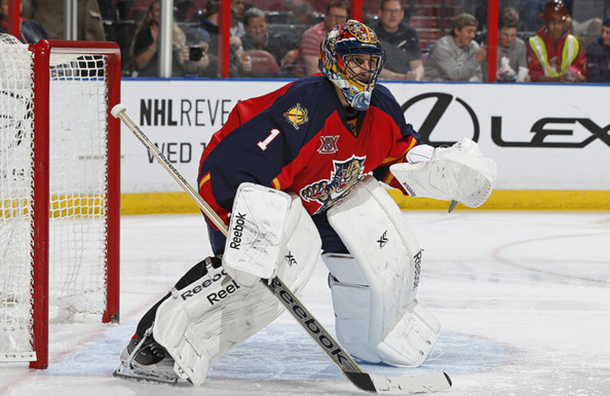
Roberto Luongo got a raw deal in Vancouver
TORONTO – Sports – A long and painful journey ended for Roberto Luongo on last week’s trade deadline.
He was once a hero in Vancouver; a celebrated all-star who was going to lead the team to glory.
But that was seven long years ago. It’s mind boggling how a relationship that once held so much promise and seemed destined to end in glory could turn so sour so quickly.
Luongo was already a superstar before getting dealt to Vancouver in 2006. He had established himself as one of the league’s elite goaltenders during stints with the New York Islanders and Florida Panthers and had already shattered every Panthers franchise goaltending record.
The netminder arrived in Vancouver with expectations of being the last piece of the puzzle to get the Canucks over the hump. He would join with other young stars like the Sedin twins, Ryan Kesler, Dan Hamuis and Kevin Bieksa to form the core of a potential Canucks dynasty.
For his part, Luongo did deliver on much of that promise. In his first season in Vancouver he tied Bernie Parent’s record for most wins by a goaltender in a season with 47. He followed that up with an equally impressive playoff performance including a 72 save performance in an OT time win over the Dallas Stars during their first round series and a 56 save performance in a losing effort against the Anaheim Ducks who went on to win the Stanley Cup that season.
Luongo followed that up by putting up solid numbers in his second season. But a late season collapse caused the Canucks to miss the playoffs. Regardless he was named the team’s captain prior to the 2008-09 season and put up a franchise record nine shut-outs during the regular season before guiding the Canucks to a first round sweep of the St. Louis Blues. The team then fell in six games to the Chicago Blackhawks.
This was the first crack in the Vancouver fan-base and team’s love affair with their goaltender. Luongo was pretty much universally blasted for his performance in which he allowed seven goals en route to a 7-5 loss to the Hawks which eliminated the team from the playoffs.
Nevermind the fact that his team quit in front of him or the fact that the defense completely collapsed in front of him, the blame was placed solely on Luongo alone by the Vancouver fans and media. For his part, Luongo weathered the storm well and apologized to the fan-base and team for “letting them down.” It was an apology that any honest hockey fan who watched the putrid effort in front of him would have deemed completely unnecessary.
However, fans and Vancouver media started to publicly demand a trade around this time. Curiously, Canucks GM Mike Gillis responded by instead inking Luongo to a deal that was unprecedented for a goaltender. A monster 12 year, $64 million contract with an annual $5.33 million cap hit.
The fans who demanded that Luongo would be traded certainly couldn’t have been happy with that deal.
Luongo appeared in 68 games for the Canucks that season and guided them to 40 wins and another playoff berth. This season was also the year that Vancouver hosted the Olympic Winter Games and Luongo backstopped Canada to their first gold medal in eight years. With a monster contract, a winning team and an Olympic gold medal, this promised to be a winning year for Luongo.
It certainly seemed that way as Vancouver bounced Los Angeles in six games before meeting the Chicago Blackhawks in the second round, a team that had eliminated them in six games just one year before. The result was the same. The Hawks bounced the Canucks in six games.
Also similar was the blame that Luongo took for the loss. Nevermind that hockey is a team game and it takes a total team effort to win a series. Nevermind that the Chicago Blackhawks were an exceptional team that went on to win the Stanley Cup that season. The blame once again is aimed squarely at Roberto Luongo. The “choker” tab was attached to him. Accusations about not being able to handle pressure or the Chicago crowds ensued.
Luongo once again shook off the criticism and started the 2010-11 in fine form including a stretch where he went 11-1-2 with a 2.08 GAA and a .922 save percentage. He’d finish the season with an NHL leading 38 wins and formed the best tandem in the NHL with backup Cory Schneider. The duo won the NHL’s William M. Jennings trophy for leading the Canucks to the lowest goals against average in the league. Behind such solid goaltending, the team finished first in the Western Conference.
The stage was set for a showdown with the Chicago Blackhawks for the third straight season. The Canucks went up three games to none and looked to be on the verge of exorcising the demons that plagued this team whenever they were matched up against Chicago. Until they dropped games 4 and 5 which each saw Luongo pulled in favour or Cory Schneider. Schneider was given the start for game six but an injury in the third brought Luongo in. He looked stellar in relief but the Hawks prevailed in overtime. Finally Luongo was given the go-ahead for the deciding seventh game and was absolutely masterful guiding the Canucks to a 2-1 victory and finally a series win over the Blackhawks.
In the second round series against the Nashville Predators, Luongo held them to just 11 goals over six games in the victory. He gave a similarly dominant performance against the offensive powerhouse San Jose Sharks in the conference finals before guiding Vancouver to its first Stanley Cup appearance since 1994 against the Boston Bruins.
In the Stanley Cup final, the Canucks jumped out to a 2-0 lead before heading back to Boston. They then proceeded to get thrashed, with Luongo surrendering eight goals in game three and being pulled in game four after surrendering four goals on twenty shots. He then followed that up with a masterful performance in game five posting a shut out as the Canucks beat the Bruins 1-0. The team struggled again in game six with Luongo again pulled after allowing three goals in the first three minutes of the game and ultimately losing 5-2. The Canucks then dropped the 7th and deciding game to Boston 4-0.
The reaction of the Vancouver fanbase was rabid. They rioted and looted the city of Vancouver in the wake of the cities loss. When things calmed down one man was to left to take the blame for the Canucks Stanley Cup failure: Roberto Luongo.
Again for that narrative to make any sense, you’d have to ignore Luongo’s masterful play in the second and third rounds. His dominant performance in games 1, 2 and 5 of the Stanley Cup finals. The fact that the Canucks offensive was virtually invisible throughout the series. The fact that the Canucks defencemen were pushed around at will by the bigger, tougher Boston Bruins forwards. There was also the distinct possibility that Canucks bench boss Alain Vigneault was simply outcoached by Claude Julien. None of those seemed to matter, however, as Luongo and Luongo alone took the blame from fans and the Vancouver media for the loss.
The following season saw Luongo share more games with Schneider. Especially after he suffered an upper body injury which sidelined him for a few games and saw him serve as Schneider’s back-up for a stretch even after he was recovered. Despite this, Luongo still appeared in 55 games for Vancouver going 31-14-8 with a 2.41 GAA and a save percentage of .919. Behind the Luongo-Schneider tandem, the Canucks finished with the best record in the league.
The regular season record was all for not, however, as the Canucks were bounced out of the playoffs by the 8th seeded Los Angeles Kings in five games. The Kings would eventually go on to win the Cup. The true controversy of the series was the fact that after going down 2 games to none, the decision was made for Luongo to be benched in favour of Cory Schneider. This decision came despite Luongo looking stellar in the first two games. Many thought that this decision was an indication of the club’s intention to trade Luongo and he stated that he’d be willing to waive his no trade clause to facilitate a move.
Instead they demoted him.
Roberto Luongo became Cory Schneider’s back-up for the lock-out shorted 2013 season. He appeared in only 20 of the 48 games of the lock-out shortened season. He made jokes about being the back-up on his twitter account, publicly stated his support for Schneider and went above and beyond being a professional about the situation. Certainly more than coach Alain Vigneault was, going on about how the Canucks were “Cory’s team” and crediting Schneider solely with the team’s success that season.
If karma does exist, perhaps it came around for the Canucks bench boss. The team was bounced in the first round that off season in four straight games by the Sharks and Vigneault was fired and replaced by former Rangers coach John Tortorella. A new beginning was on the horizon for Luongo as well as Canucks GM made a deal with the New Jersey Devils on draft day 2013 and traded…..Corey Schneider?!? It was one of the most puzzling decisions in recent memory. The Canucks starter was dealt and the man who was demoted to back-up was kept. Many would cite Luongo’s contract as the reason he wasn’t able to be traded. And in fact, the Vancouver media, fan-base and even sources within the organization itself seemed to place the blame to Schneider’s departure squarely at Luongo’s feet.
Again a lot of facts would have to be ignored to make that case. You’d have to ignore the fact that Luongo didn’t chose to offer himself that contract,the fact that any professional athlete would be foolish to turn down that sort of career stability or the fact that Luongo was a complete professional throughout the whole process. He stepped aside for Schneider and never made much of a fuss about him demotion. He waived his no-trade clause when asked to by the team. He also lamented that his contract “sucks” when it became clear that it wanted to be traded.
For a man whose employer made every indication that they didn’t want his services, Roberto Luongo was a complete and utter professional. Now he’d be asked to be again.
Despite selling his penthouse in Vancouver, Luongo would now stay on and once again be the number one man in Vancouver. He got the vote of confidence from new coach John Tortorella and GM Mike Gillis. The Canucks were once again his squad. Things seemed to go well for Luongo as he looked re-energized despite having the worst team in front of him since his arrival in Vancouver. Appearing in 42 games for the team he backstopped them to a 19-16-6 record with three shutouts, a 2.38 GAA and a .917 save percentage. Given how badly the Canucks have been this season, his efforts have been downright heroic.
Those efforts didn’t go unnoticed by the Canadian Olympic team as Luongo was selected to serve as back-up to Carey Price. Appearing in one game and posting a shut-out, he earned his second goal medal as Canada repeated as Olympic champions.
Luongo returned geared up for the rest of the season with Vancouver when something odd happened. The Heritage Classic outdoor game, one of the biggest events on the NHL calendar, an outdoor game between the Ottawa Senators and the Vancouver Canucks was coming up and the starter for Vancouver would be Eddie Lack and not Roberto Luongo.
This news sent waves through the hockey world. A snub of this magnitude to their starting goaltender was unthinkable. The Canucks had seemingly ended one goaltending controversy to seemingly start another one. It was an outright slap in the face to the man who had been carrying the team all season. Nobody was quite sure what the reasoning was.
A few days later it became clear when Roberto Luongo was traded back to the Florida Panthers for Jacob Markstrom and Shawn Matthias. The Luongo era in Vancouver was over and all the promise that it began with remained unfulfilled.
It was a long sad sordid tale with really only one side to blame: the Vancouver Canucks. It is outright shameful and embarrassing that a star with the skill and magnitude of Roberto Luongo was treated the way he was. The Vancouver Canucks had him on their roster at a time when he was easily the best Canadian-born goaltender in the NHL. Even now you could argue that Luongo is still in the top two or three behind Carey Price and Mike Smith.
Yet he was asked to take a backseat to Cory Schneider and Eddie Lack.
I’m not saying that either of these men aren’t good goalies. They’re both young and have bright futures ahead of them. At this stage of the game they aren’t better than Roberto Luongo. But they are cheaper.
Therein lies the mindset behind the vilification of Luongo. His contract was an obvious attempt to circumvent the NHL’s salary cap. He was 30 years old when he signed it. There was no way anyone expected Luongo to still be playing when he was 42 years old. Gillis undoubtedly got cold feet about that cap hit. It would hamstring the Canucks and prevent them from addressing the team’s needs in other areas. This is why every time a younger-cheaper back-up showed promise, a goaltending controversy would be instantly created. To create the justification to move Luongo and to put the seeds of doubt in the minds of fans that maybe just maybe Roberto Luongo isn’t as good as we thought he was.
Luongo became a scapegoat for all of Vancouver’s failings. Every playoff exit was his fault. The Stanley Cup finals loss was his fault. It didn’t seem to matter if the team’s biggest offensive weapons were invisible or if the defense had more leaks than the Titanic. The blame was always put right on Luongo’s shoulders.
It wasn’t fair. It was never warranted.
Mike Gillis is a magician. A year ago he had two starting goaltenders and now he’s made them both disappear. The mismanagement of the Luongo situation was and is entirely his fault. He owed it to his star goaltender to trade him once it was clear that the team was going to go with Schneider. He didn’t. He is lucky that he was dealing with a human being of the calibre of Roberto Luongo who was willing to forgive and forget and carry on in Vancouver.
How did Gillis repay that understanding? By doing it again.
Whether Gillis intended to trade Luongo when the snub was made or Luongo demanded a trade after being benched for the Heritage Classic, the way the situation was handled was simply unforgivable. It was the epitome of bush league. The NHL is supposed to be a professional league and the Canucks a professional organization. This situation is the definition of unprofessional and completely without class.
There is really only one way the Canucks can handle this situation going forward and that’s by firing Mike Gillis.
As for Luongo, I wish him well in Florida away from the classless fan-base, terribly run organization and predatory media of Vancouver, I hope he finds a measure of peace. A second stint near friends and family in the sunshine state will hopefully do him some good.
Roberto Luongo was and is one of the best goalies in the world. He deserves to be treated as such.
Josh Kolic





